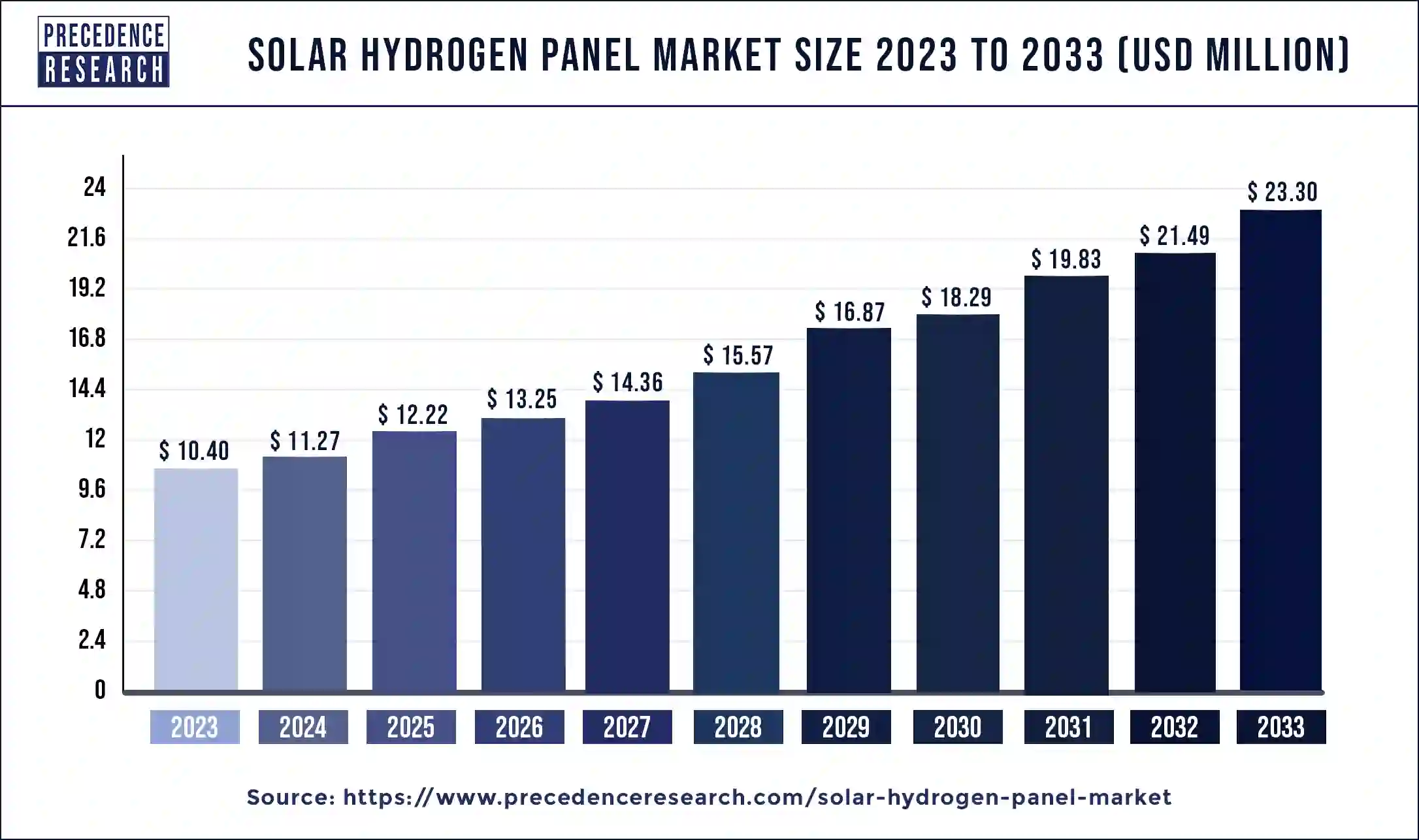The global solar hydrogen panel market size reached USD 10.40 million in 2023 and is projected to attain around USD 23.30 million by 2033, expanding at a CAGR of 8.40% from 2024 to 2033.
Key Points
- By region, Europe held the largest share of the solar hydrogen panel market with share of 40% in 2023.
- By region, North America is expected to gain a considerable share of the market during the forecast period.
- By technology, the amorphous silicon solar cell segment held the largest share of 65% in 2023 and is expected to continue to do so during the forecast period.
- By end use, the industrial segment holds the largest market share of around 54% in 2023.

The solar hydrogen panel market represents a promising segment within the renewable energy sector, driven by the growing demand for clean and sustainable energy solutions. Solar hydrogen panels, also known as photovoltaic-electrolysis systems, harness solar energy to produce hydrogen through electrolysis, offering a renewable source of fuel for various applications. This market is characterized by technological innovation, environmental sustainability, and energy independence, with significant potential for growth and expansion.
Get a Sample: https://www.precedenceresearch.com/sample/4065
Growth Factors:
Several factors contribute to the growth of the solar hydrogen panel market. First and foremost is the increasing awareness of environmental issues and the urgent need to reduce greenhouse gas emissions. Solar hydrogen panels offer a carbon-neutral energy source, as hydrogen produced through electrolysis can be used as a clean fuel for transportation, heating, and power generation, thereby mitigating the impact of fossil fuels on climate change.
Moreover, advancements in solar photovoltaic (PV) technology have significantly improved the efficiency and affordability of solar panels, making them a viable option for hydrogen production. Innovations in electrolysis technology have also enhanced the efficiency and scalability of hydrogen production, reducing costs and increasing the competitiveness of solar hydrogen panels compared to traditional fossil fuels.
Region Insights:
The adoption of solar hydrogen panels varies across different regions, influenced by factors such as solar irradiance, policy support, and energy infrastructure. Regions with abundant sunlight, such as deserts and tropical areas, are well-suited for solar hydrogen production. Countries with ambitious renewable energy targets and favorable regulatory frameworks, such as Germany, Japan, and the United States, have witnessed significant investments in solar hydrogen infrastructure and research initiatives.
In addition, island nations and remote communities lacking access to conventional energy sources have shown interest in solar hydrogen panels as a means of achieving energy independence and resilience. Developing regions with growing energy demand, such as Asia-Pacific and Africa, present untapped opportunities for solar hydrogen panel adoption, supported by international development initiatives and investments in renewable energy infrastructure.
Solar Hydrogen Panel Market Scope
| Report Coverage | Details |
| Growth Rate from 2024 to 2033 | CAGR of 8.40% |
| Global Market Size in 2023 | USD 10.40 Million |
| Global Market Size in 2024 | USD 11.27 Million |
| Global Market Size by 2033 | USD 23.30 Million |
| Largest Market | Europe |
| Base Year | 2023 |
| Forecast Period | 2024 to 2033 |
| Segments Covered | By Technology and By End-use |
| Regions Covered | North America, Europe, Asia-Pacific, Latin America, and Middle East & Africa |
Solar Hydrogen Panel Market Dynamics
Drivers:
Several drivers propel the growth of the solar hydrogen panel market. One of the primary drivers is the declining cost of solar PV technology, driven by economies of scale, technological advancements, and government incentives. As solar panels become more affordable and efficient, the cost of hydrogen production through electrolysis decreases, making solar hydrogen panels increasingly competitive with conventional fuels.
Furthermore, concerns about energy security and geopolitical instability have led many countries to explore alternative energy sources, such as hydrogen, to reduce reliance on imported fossil fuels. Solar hydrogen panels offer a decentralized and sustainable energy solution, enabling communities to generate their own fuel locally, thereby enhancing energy security and resilience.
Opportunities:
The solar hydrogen panel market presents numerous opportunities for growth and innovation. One key opportunity lies in integrating solar hydrogen production with existing energy infrastructure, such as grid systems, hydrogen refueling stations, and industrial applications. By leveraging synergies between solar PV and electrolysis technologies, stakeholders can optimize energy production, storage, and distribution, thereby enhancing the overall efficiency and reliability of renewable energy systems.
Moreover, advancements in storage technologies, such as hydrogen fuel cells and electrolyzers, enable the storage and conversion of solar energy into hydrogen for use during periods of low solar irradiance or peak energy demand. This flexibility enhances the reliability and stability of renewable energy systems, facilitating the transition to a more resilient and sustainable energy future.
Furthermore, collaborations between governments, industry players, and research institutions can accelerate the development and commercialization of solar hydrogen panel technologies. Public-private partnerships, research grants, and incentive programs can incentivize investments in research and development, pilot projects, and demonstration initiatives, thereby fostering innovation and driving down costs.
Challenges:
Despite the opportunities presented by solar hydrogen panels, several challenges must be addressed to realize their full potential. One challenge is the intermittency of solar energy, which can affect the reliability and consistency of hydrogen production. Solutions such as energy storage, grid integration, and demand-side management are needed to address these challenges and ensure a reliable supply of hydrogen.
Moreover, the scalability of electrolysis technology and the availability of raw materials, such as water and electrolytes, pose challenges to widespread adoption. Research and development efforts are needed to improve the efficiency, durability, and cost-effectiveness of electrolysis systems, as well as to optimize the use of resources and minimize environmental impacts.
Furthermore, regulatory barriers, lack of infrastructure, and market uncertainties can hinder investment and deployment of solar hydrogen panels. Policy support, regulatory frameworks, and financial incentives are needed to stimulate demand, encourage investment, and create a conducive environment for innovation and growth in the solar hydrogen panel market.
Read Also: Antibacterial Products Market Size to Reach USD 56.70 Bn by 2033
Recent Developments
- In June 2023, Automated Meteorological Station AWS810 Solar Edition is now available! Vaisala, a leader in meteorological, environmental, and industrial measurements worldwide, announced this today. In order to maximize solar power plant performance and operational efficiency, the IEC-compliant weather station enables the integration of observations of solar irradiance and important meteorological parameters with optional advanced analytics and digital insights.
Solar Hydrogen Panel Market Companies
- Heliogen
- LAVO Hydrogen Technology
- SunHydrogen
- Hydrogenics
- Hyet Solar
- Power to Gas
- Enapter
- Cummins
Segment Covered in the Report
By Technology
- Amorphous silicon solar cells
- Nano solar cells
- Others
By End-use
- Residential
- Industrial
- Mobility
- Others
By Geography
- North America
- Asia Pacific
- Europe
- Latin America
- Middle East & Africa
Contact Us:
Mr. Alex
Sales Manager
Call: +1 9197 992 333
Email: sales@precedenceresearch.com
Web: https://www.precedenceresearch.com
Blog: https://www.expresswebwire.com/
